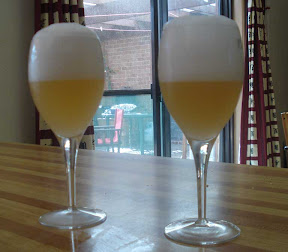A voluptuous little number…
(There should be a couple of images in this entry. If you’re using Firefox, you might not see them)
This beer is full bodied, flavourful and about 10% ABV (I want to say ‘it goes to eleven’…) . Appropriate precautions are recommended. It’s only a week old, so it can only get better.
Ingredients
- 7 kg wheat (including a few dozen weevils)
- 25 g Tettnang hops
- 1 kg dextrose
- 1 kg Coopers Brew Enhancer #1
- 1 oz coriander seeds
- 11.5 g Safbrew WB-06 yeast
Day 1
Washed the wheat well to get rid of chaff and weevils, and soaked from ~13h to 21:30. Drained and rested overnight. Seven kg is about 2 kg more than I’d normally use, but the last batch was not very strong and I wanted to use the wheat up.
Day 2: Germination
Washed again, and added water to cover at 08:30. Drained about 18h, and put into various roasting dishes, casserole pots etc. in plastic bags in the dark.
Day 5: Drying
This time I pushed the germination for an extra day, as it was a bit cooler than the last time.
Took about 1/6th of the total amount and dried/roasted in the Weber gas barbecue (up to 80 – 90°C). I dried the rest in a very slow but ‘normal’ fan oven, over the following two nights.
Day 7: Milling and mashing
This time, I used the large blender on the Kenwood. When I was certain the grain (light malt) was dry I blended it in 1 1/4 – 1 1/2 pint batches, in 30 s – 1 minute bursts on high. About 3.9 kg of this went through the colander, and I re-blended the remaining 1.6 kg grain the same way.
For the dark malt, I finished the drying b y roasting at 125°C for about 20 minutes. Some of the grains had burned while on the gas, but I blended all 1.1 kg of it in 1 1/2 pint lots, once, hard. It smelled of nuts and chocolate and coffee; quite incredible!
I heated 15l water to 53°C in the ‘big’ barrel and added all the light malt, and let sit for about 45 minutes. I took half of the mash and warmed it in the stock pot through 60 – 70 °C for about an hour, then heated to 80 – 90 °C for 30 minutes. In the meantime I boiled up the dark malt in about half a gallon (bit more), strained it, sparged with 2 l boiling water, then boiled the combined extract with the hops for about half an hour.
I poured the boiling ‘coffee’/hops mixture over the dextrose and brew enhancer, mixed it up and combined with the first light mash (I used extra dextrose and brew enhancer because the previous batch, although fantastic to taste, was rather weak and I wanted to boost the ABV. Turns out that I’ve got the malting and milling right this time, and needn’t have worried. . .). We strained the light mash through a muslin bag and sparged with a few litres of boiling water.
I threw in about an ounce of whole coriander seeds to the mix, and mashed the second batch of light malt at 60 – 70 °C for about an hour. Again, this was strained into the existing mix, and the whole brought up to 21 l by pouring boiling water through the bag. In retrospect, I should have taken it to 23l, or even more.
Days 8 – 15: Fermentation
Next day, the mash was down to 34 °C. This was a little high, but the weather had turned warm again and the mash was not going to cool quickly. I was worried about contamination (as in the first wheat batch I ever tried) so I thought ‘sod it’ and threw the yeast on top. I measured the SG at 1070.
Ploppy beer – end of Day 8.
The following Sunday, although the plopping hadn’t quite stopped, the specific gravity had been steady at 1005 for two days, so we bottled it. This is equivalent to ~8.5 % ABV, before the priming sugar ferments. . .
Today is day 21. It’s drinkable, already. It’s very strong, and we’re going to attempt to forget about it for a couple of weeks, and get our livers into some serious training.


